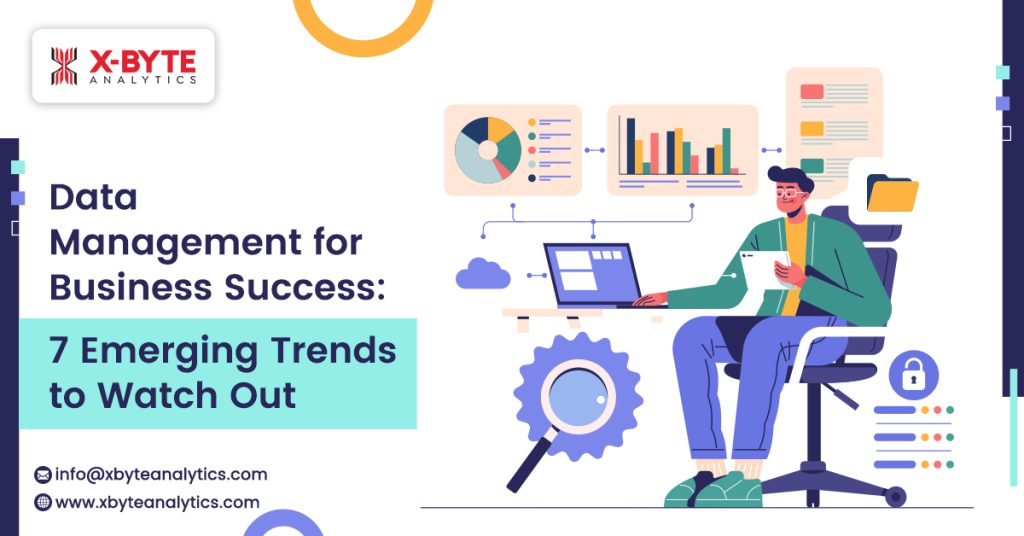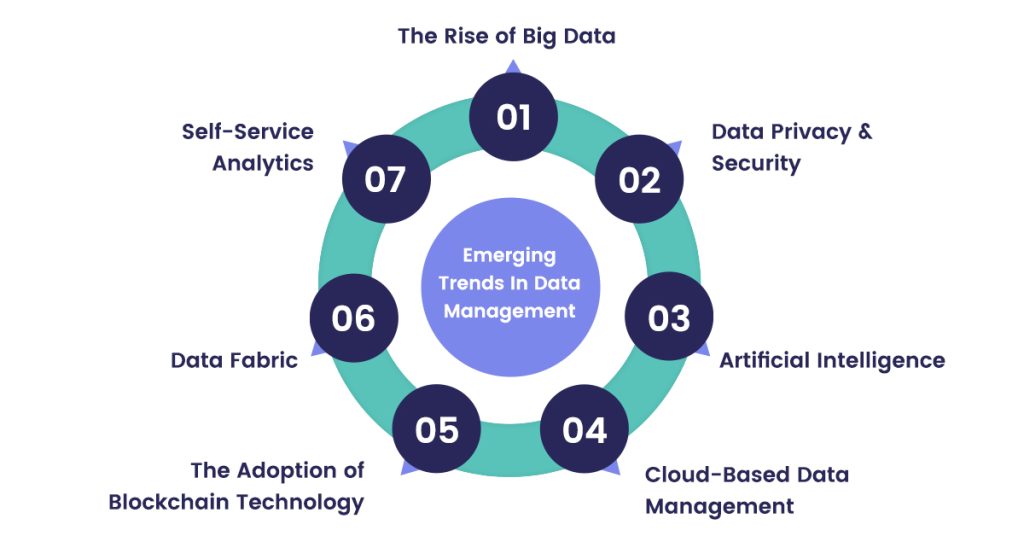
The amount of data generated per second has grown by more than 70% since 2010, and the rate is expected to grow at a compound annual growth rate (CAGR) of 20% over the next five years. By 2025, it is estimated that there will be more data than ever before, with an estimated 2.5 quintillion bytes created every day.
Data Management ensures businesses harness this information for competitive advantage and drive their business forward. In this article, we look at seven emerging trends in data management for business success.
What Is Data Management?
You can think of data as a company’s information. It is the process of managing data throughout its entire life cycle. It involves various techniques, tools, and strategies, like customer names, addresses, and purchase history.
This ensures that this information is collected, stored, and organized in a way that is easy to access and use. It also protects the data from loss, theft, or damage.
Effective data management is essential as it helps you make informed decisions based on insights derived from their data. For example, a company might use data management to analyze customer behavior and improve its products or services.
Importance of Data Management
Data is the most valuable asset of any business. It is what defines your business and gives it a competitive advantage over others. The more data you have on your customers, the better you can understand them. This allows you to tailor your products and services to their needs, increasing customer satisfaction and loyalty.
One of the primary importance of data is that it can help you improve efficiency and productivity. Using data analytics tools, you can analyze past performance and make changes to improve results in the future. The more data you have available, the better informed your decisions will be.
Another key benefit of having a solid data management system is that it can help you make better decisions about what you need to do with your data. It will help you find answers faster and ensure your information is accurate before sharing it with others.

Top 7 Emerging Trends In Data Management
Data is the new oil and will be a crucial future driver. With that in mind, we have compiled a list of seven emerging trends in data management that will shape the evolution of business.
- The Rise of Big Data
The rise of big data has meant that businesses can now access much information, but the challenge is how to make sense of it all.
With so much data being produced, particularly in the digital world, businesses must ensure they can take advantage of this new resource. However, it’s not just about the volume; it’s also about how you use the data and how it will benefit your business.
Big data is a term that describes information collected from many sources at once. It can be used for various purposes, including improving customer engagement and decision-making processes and increasing organizational efficiency.
- Data Privacy & Security
It is one of businesses’ most critical issues today. As the volume of data people share online grows exponentially each year, so does the risk of data loss or theft from hackers looking to steal that information. Data breaches can result in huge company fines and even prison time for employees responsible for such breaches. With GDPR coming into effect soon, businesses must take extra steps to protect their customers’ personal information and company data.
- Artificial Intelligence
Artificial intelligence (AI) is the technology that allows machines to think like humans. It has already been used to write news articles, recommend products, and make loan decisions.
Artificial intelligence can be applied to the world of data management.
It is a new field that is becoming more popular but is still very much in its infancy. AI systems can be trained to learn how to deal with data in various ways, from understanding its structure and relationships to processing it to make predictions or recommendations.
- Cloud-Based Data Management
The cloud is becoming a big part of the data management landscape. The cloud offers the ability to scale up and down without worrying about server space or other factors affecting your business. Cloud computing allows companies to store and manage their data in an automated manner, so they can focus on running their business and not worrying about IT.
Cloud-based data management services are especially beneficial for small businesses with little money or resources to invest in new software or hardware. Instead, they can use cloud-based services like Amazon Web Services (AWS), Microsoft Azure, and Google Cloud Platform to store and manage their information.
- The Adoption of Blockchain Technology
Blockchain is a distributed ledger that maintains a continuously growing list of ordered records called blocks. Each block contains a hash pointer as a link to a previous block, a timestamp, and transaction data.
The blockchain is inherently resistant to modification of the data structure or the links in the chain because the blockchain is distributed across many computers, which means that all the records cannot be changed at once by any one computer in the network.
- Data Fabric
Data fabric is a new term that describes creating and managing a data fabric. The concept behind the fabric is that it enables users to create, manage and model their data.
Data Fabric is a key technology for the future of enterprise architecture.
It allows organizations to manage their data in an automated fashion, making accessing and using information easier. It also allows them to scale as they grow, which will be important as companies expand their data stores.
- Self-Service Analytics
In the last few years, we have seen a significant shift in how companies use analytics. Instead of relying on a data analyst to build custom reports and dashboards, many companies are turning to self-service tools like Google Analytics and Tableau.
These tools allow users to create their own reports and dashboards without hiring a data analyst or IT department. This trend will continue to grow as more companies realize they do not need expensive data analysts to build simple reports and dashboards.
The cost savings from using self-service analytics can be huge. For example, a company might spend $1 million annually on IT services for an in-house data team. By outsourcing this role to an outside vendor or hiring an employee directly, the company could save $1 million per year.
Wrapping Up
With data management, we have come to a crossroads. Collecting and managing data for business success is essential. Still, it has become more difficult as the volume of data has increased, and the technology we use to collect and store data has become more complex. The solutions we explored in this article are being used around the world. Getting started with them will help businesses manage the data influx needed to make wise strategic decisions.

